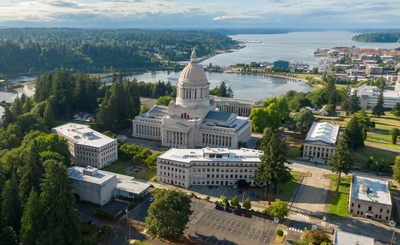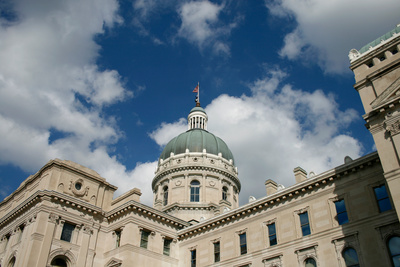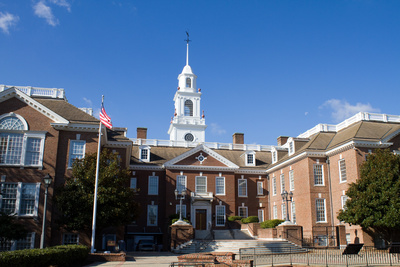
Technology & Privacy
How AI-Generated Content Laws Are Changing Across the Country
February 12, 2026 | Max Rieper
February 19, 2020 | Kim Miller

Key Takeaways:
Facial recognition has become a frequent topic of conversation at the local, state, and federal levels. But how is facial recognition technology being used? As is often the case, policymakers will need to address concerns on a rapidly progressing technology.
Facial recognition technology gained widespread attention when Apple incorporated the technology into the iPhone X as a phone unlocking method. But uses of this technology go beyond unlocking smartphones. Police departments, schools, retailers, and airlines are using facial recognition to do everything from ensuring student attendance to identifying criminal suspects.
Importantly, facial recognition technology raises substantial concerns about privacy, accuracy, and implicit bias. State and local policymakers are beginning to study current and future uses of facial recognition technology and make decisions to restrict or ban its use.
Law enforcement agencies are some of the most prominent users of facial recognition technology. In New York, state investigators have used facial recognition to make thousands of arrests and identify more than 20,0000 cases of identity theft and fraud since 2010. In Maryland, facial recognition was used to help identify the Capital Gazette shooter after police were unable to identify the shooter using his fingerprints.
For facial recognition technology to identify people there must be an existing image of an individual that will accurately identify the person. One of the largest sources of images is the databases of driver’s license and identity card photos held by state departments of motor vehicles. Currently, 21 states and the District of Columbia allow federal agencies, such as the FBI, to access databases containing driver’s license and identification card pictures.

The Department of Homeland Security currently uses facial recognition to scan images of travelers leaving and exiting the country and compares the image to photos that are already on file, such as passport photos. Retailers have used facial recognition to combat shoplifting by scanning shopper’s faces and comparing them to photos in a database of known shoplifters.
Finally, facial recognition is increasingly, and controversially, used in schools. School districts utilize the technology for school safety to alert administrators, teachers, and security staff when an unauthorized individual has entered school grounds. However, facial recognition’s use in school has been met with mixed reactions from parents.
Privacy remains the primary concern surrounding facial recognition technology and privacy advocates have noted that facial recognition is prone to misuse. Additional concerns include mass government surveillance, inaccuracies, inherent cultural biases, and a lack of consent.
For example, law enforcement agencies can access the DMV photo databases without individuals’ prior notification or consent that their pictures may be used in this manner. Recently, concerns have been raised about Clearview AI, a company that scrapes images from Facebook, Twitter, YouTube, and other social media sites without any notification to users and incorporates them into a facial recognition database that has been sold to hundreds of police departments.
Another concern surrounding facial recognition technology is its accuracy. Given that facial recognition technology is being used to identify suspects in a crime and to ban people from stores it is extremely important that facial recognition technology is able to accurately identify people. However, recently facial recognition was tested using images of the 535 members of congress and incorrectly matched 28 members with individuals who had been charged with a crime. While this error rate is relatively small, about 5 percent, such misidentification could have severe consequences for misidentified individuals if used in a real-world setting.
Policymakers in the states and localities have begun to respond to the rising use of facial recognition technology.
In 2014, New Hampshire became the first state to enact a ban on facial recognition technology by prohibiting the department of motor vehicles from using any facial recognition technology in connection with taking or retaining photographs and digital images. Oregon followed shortly thereafter in 2015 by prohibiting police departments throughout the state from using facial recognition technology to analyze recordings obtained through police body cameras. In 2016, New Hampshire strengthened its laws on facial recognition by enacting a bill similar to Oregon’s that also prohibited police from using facial recognition to analyze images captured from body cameras. In 2019, California became the third state to ban the use of facial recognition technology to analyze images captured by police body cameras.
Some cities have gone as far as banning the use of facial recognition technology altogether. Last year, San Francisco became the first city to completely ban local government agencies’, including law enforcement, use of facial recognition. Oakland and Somerville, Massachusetts, soon instituted similar bans.
As most states begin their 2020 legislative sessions, lawmakers are increasingly introducing legislation addressing the use of facial recognition technology. In addition to the states highlighted below, Virginia, New Hampshire, Hawaii, Missouri, Indiana, Massachusetts, and South Dakota are also considering facial recognition bills.
These bills signal a desire among state lawmakers to limit facial recognition technology until its implications are better understood. Whatever the future of facial recognition, lawmakers are approaching the technology with relative caution and a desire to understand the most effective and safe manner to incorporate it into public life.

In Washington, lawmakers are considering a ban on facial recognition technology until 2023 while a task force reviews existing research, documents potential threats, and provides recommendations for appropriate regulations (WA HB 2856). Washington lawmakers have also introduced a bill that would prohibit police officers from using the results from a facial recognition system as the sole basis for establishing probable cause in criminal investigations and requires that facial recognition system results be used in conjunction with other evidence to establish probable cause (WA HB 1654/WA SB 5528).
In New York, lawmakers have introduced two bills that prohibit law enforcement officers from using facial recognition technology (NY SB 7572 and NY SB 6776) as well as a bill that prevents the use of facial recognition technology in schools until 2022 (NY AB 6787/NY SB 5140). New York lawmakers are also considering legislation (NY SB 6623/NY AB 8042) that would establish a task force to study privacy concerns and regulatory approaches to the development of facial recognition technology.
In New Jersey, lawmakers introduced legislation that would require law enforcement agencies to hold public hearings prior to using facial recognition technology (NJ AB 1210), require the state attorney general to test facial recognition systems (NJ AB 989), and to restrict the use of facial recognition technology by government entities without safeguards such as standards for the use and management of information derived from the facial recognition system, audits to ensure accuracy, implementing protections for due process and privacy, and compliance measure (NJ SB 116).
Maryland lawmakers have introduced legislation that would prohibit state and local government units from using facial recognition software (MD SB 857) and require businesses to provide notice when facial recognition is being used and to generally require consent from an individual before their facial image can be included in a database (MD SB 476).
Lawmakers in Illinois have introduced legislation that would amend the Illinois Identification Card Act to prohibit providing facial recognition search services on photographs used for driver’s licenses and identification cards to any federal, state, or local law enforcement agency (IL HB 4525 and IL SB 2269).

February 12, 2026 | Max Rieper

February 4, 2026 | Max Rieper

January 21, 2026 | Abbie Telgenhof